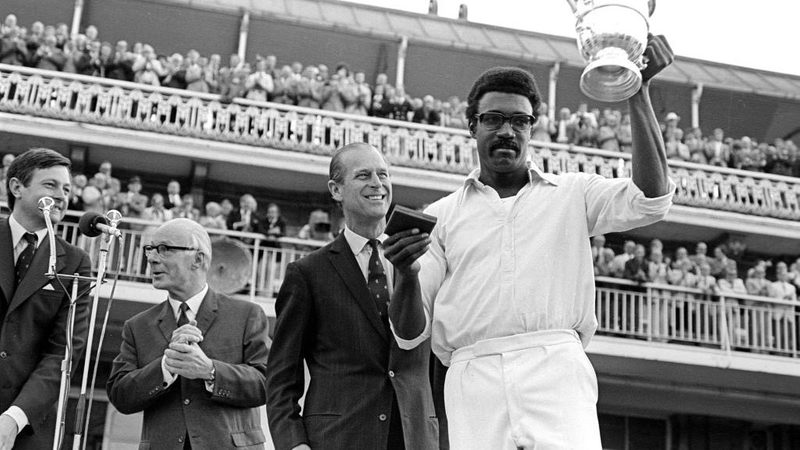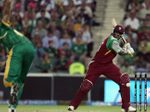
Since gaining the Test status in 1928, West Indies cricket players have captured the imagination of the cricketing world with their unique flair and finesse. The West Indies cricket team has a rich history in the sport and has always been blessed with great players since their early days as a Test-playing nation.
The team has produced great cricketing stars who have graced the game and produced legendary performances across eras. Here are some West Indies cricket players who have been an inspiration to their era:
Learie Constantine: The impact man of West Indies cricket during 1920s
One of the greatest West Indies cricket players to have graced the ‘gentleman’s game’, Learie Constantine was part of the British West Indies squad that toured England in 1923 and 1928. West Indies’ first wicket-taker in Test cricket, Learie Constantine played 18 Test matches before World War II and finished his Test career with 635 runs and 58 wickets. His 5/85 had helped the West Indies secure their first Test victory against England in the British Guiana back then.
However, Learie Constantine’s contribution to world cricket goes well beyond cricket. The West Indies all-rounder was an advocate against racial discrimination and was also instrumental in the passing of the 1965 Race Relations Act in Britain. Learie Constantine was knighted in 1962 and he also became the first black peer of the United Kingdom. He was chosen as one of the Wisden Cricketers of the Year in 1939.
#OnThisDay in 1902, Learie Constantine was born. A West Indies all-rounder, he went on to be a barrister and Trinidad's High Commissioner pic.twitter.com/RlQSDBbkVy
— ICC (@ICC) September 21, 2016
George Headley: The West Indies legend who almost overshadowed Don Bradman
Hailed as the Black Bradman, George Headley is considered to be one of the greatest cricketers of all time and one of the best batsmen to ever play for the West Indies. Headley played 22 Test matches, mostly before the Second World War and was widely believed to be the second-best batsman after Don Bradman in his playing days.
#OnThisDay in 1909, Windies legend George Headley was born.
— ICC (@ICC) May 30, 2018
In 22 Tests he scored 2,190 runs at an average of 60.83, including 10 centuries and five fifties, earning him the nickname 'the black Bradman'. pic.twitter.com/XryCuAjIHK
In international cricket, George Headley had amassed 2,190 runs in just 22 Test matches at a staggering average of 60.83 with 10 hundreds and five fifties. It is the fifth-highest career batting average in the all-time list of averages of players with more than 20 Tests - after Don Bradman, Steve Smith, Adam Voges and Graeme Pollock.
West Indies’ legendary trio of Everton Weekes, Clyde Walcott and Frank Worrell
Everton Weekes, Clyde Walcott and Frank Worrell, known as the Three Ws, formed one of the greatest middle-order combinations between 1948 and 1960. The three legends had played a significant role in changing the face of West Indies cricket with the bat, ball as well as with their gamesmanship.
Among the immortal Three Ws, Everton Weekes was the highest-ranked player. He had scored 4,455 runs in just 48 Test matches at an average of 58.61. Interestingly, Weekes had smashed five consecutive centuries against England and India, which is still a Test record.
On the other hand, Clyde Walcott was arguably the best batsman in the world in the mid-1950s. He had played 44 Test matches, accumulating 3,798 runs at an average of 56.68. Walcott’s match-winning 168 not out had helped the West Indies claim their first-ever Test victory on English soil at the Lord’s in 1950.
Meanwhile, Frank Worrell had played 51 Test matches, scoring 3,860 runs at an average of 49.48 and he had also claimed 69 wickets at an average of 38.72.
Weekes, Walcott and Worrell were later knighted for their incredible services to the sport.
Our hearts are heavy as we mourn the loss of an icon. A legend, our hero, Sir Everton Weekes. Our condolences go out to his family, friends and many fans around the world. May he rest in peace. 🙏🏽 pic.twitter.com/RnwoJkhjPd
— Windies Cricket (@windiescricket) July 1, 2020
Garfield Sobers: Arguably the greatest all-rounder in cricket
Garfield Sobers is widely considered to be cricket’s greatest ever all-rounder, having scored more than 28,000 runs and claiming over 1,000 wickets in 383 First-Class matches.
Having made his Test debut for the West Indies at the age of 17 in 1954, Gary Sobers played 93 Test matches, amassing 8,032 runs at an average of 57.78 and scalping 235 wickets at an average of 34.03.
The southpaw had also established a world record back then for the highest individual score in an innings after he had smashed an unbeaten 365 against Pakistan at the Sabina Park in 1958. His record was later broken by Brian Lara, who had scored 375 against England in 1994.
The Barbados-born cricketer also became the captain of the West Indies cricket team in 1965, the role which he served until 1972. Sobers was made the skipper of the Rest of the World XI during their tour of England in 1970. Gary Sobers was inducted into the ICC Cricket Hall of Fame in 2009.
One of the world's greatest cricketers 👏
— Lord's Cricket Ground (@HomeOfCricket) August 24, 2020
📅 #OnThisDay in 1973, Sir Garfield Sobers hit his final Test century for @windiescricket at Lord's.#LoveLords
Rohan Kanhai: An inspiration to many including Sunil Gavaskar
Rohan Kanhai was the first Indian-origin cricketer to captain West Indies and the second after Sonny Ramadhin to play for the West Indies. Kanhai is considered to be one of the best batsmen of the 1960s.
Kanhai accumulated 6,227 runs in the 79 Test matches he had played at an average of 47.53, smashing 15 hundreds and 28 fifties in the longest format of the game. The right-handed batsman had also played seven ODIs, amassing 164 runs at an average of 54.66.
He was an inspiration to many cricketers including Sunil Gavaskar, who had named his son Rohan after the West Indies legend.
A friend's comment just reminded me of the wonderful shared legacy of India West Indies cricket. Both Sunil Narine and Sunil Ambris were named after Indian batting legend Sunil Gavaskar and Rohan Gavaskar in turn was named in honour of the legendary West Indian, Rohan Kanhai.
— Joy Bhattacharjya (@joybhattacharj) June 27, 2019
The legendary Bob Marley and Kanhai’s teammate Alvin Kallicharran had also named their respective sons after Kanhai.
What connects Sunil Gavaskar and Reggae legend Bob Marley? They named their sons after cricketer Rohan Kanhai!
— Joy Bhattacharjya (@joybhattacharj) November 18, 2019
Both Rohan's have done well. Gavaskar scored nearly 7000 1st class runs & played 11 ODIs. Marley played American football for Miami U & is a startup specialist!
Rohan was part of the West Indies team that won the inaugural 1975 Cricket World Cup. He was inducted into the ICC Hall of Fame in 2009.
Clive Lloyd: The man who united West Indies to dominate world cricket
Under the leadership of Clive Lloyd, the West Indies had dominated world cricket for over a decade. Lloyd had captained West Indies between 1974 and 1985, helping them rise as the leading side in Test cricket. He had also led West Indies in three World Cups, winning the first two editions of the quadrennial tournament, and were on course for a hat-trick of world titles if not for a stunning upset by India at the Lord’s in 1983.
Happy Birthday to one of the finest captains in history, who led West Indies to the @cricketworldcup title in 1975 and 1979 - Clive Lloyd! pic.twitter.com/CsqNabbT5B
— ICC (@ICC) August 31, 2017
Lloyd had propelled West Indies to 36 Test victories in 74 matches with only 12 defeats coming under his leadership. He is the fourth most successful Test captain in terms of matches won, only behind Graeme Smith (53), Ricky Ponting (48) and Steve Waugh (41).
On the other hand, under Lloyd’s leadership in the ODI format, the West Indies had won a staggering 64 games out of 84 matches with a win percentage of 77.71.
The towering West Indian -- Clive Lloyd was 6’4” -- scored 7,515 runs in 110 Test matches at an average of 46.67. In the One-Day Internationals, the southpaw has amassed 1,977 runs in 87 games at an average of 39.54.
Llyod had won the Wisden Cricketer of the Year award in 1971 and was later inducted into the ICC Hall of Fame in 2009.
He was knighted for his services to the sport in the 2020 New Year Honours
Viv Richards: The man who destroyed fast-bowlers without helmet
Isaac Vivian Alexander Richards is undoubtedly one of the greatest cricketers the world has ever seen. Considered by many to be the most devastating and feared batsman of all time, nothing in cricket could intimidate opponents like the sight of Viv Richards walking out to bat. Cricket fans across the world would wait hours for him to arrive and then go on a rampage, destroying bowlers of his generation.
Good old days of Cricket 🏏
— @Georgebakhos1 (@GeorgeBakhos1) December 8, 2020
VIV RICHARDS no helmet ⛑ smashing best bowlers around .
Today batting average are very inflated . Take 10 runs off I say . pic.twitter.com/ALfjgoJ3dW
Viv Richards was chosen by Wisden as the greatest ODI batsman of all time, as well as the third greatest Test batsman of all time, after Sir Don Bradman and Sachin Tendulkar in December 2002.
Richards was voted one of the five Cricketers of the Century by a 100-member panel of experts in 2000, along with Sir Donald Bradman, Sir Garfield Sobers, Sir Jack Hobbs and Shane Warne.
His consistent match-winning performances resulted in him becoming the first cricketer in ODI history to achieve 20 Man of the Match awards.
He was Man of the Match in the 1979 Cricket World Cup final - Happy Birthday to West Indies legend Sir Viv Richards! pic.twitter.com/D7t7i39jLs
— Cricket World Cup (@cricketworldcup) March 7, 2017
Richards scored nearly 7,000 runs in ODIs at a staggering strike rate of over 90 in those days and more than 36,000 runs in First-Class cricket. He had also featured in 121 Tests, amassing more than 8,000 runs at an average of more than 50.
The former West Indies skipper was knighted for his contribution to the game in 1999. Richards was also inducted into the ICC Hall of Fame in 2009.
Brian Lara: West Indies cricket legend who holds several world records
Once invincible in Test cricket and the 50-overs format, the West Indies cricket team had lost their aura by the 1990s. However, while their victories dried with years, their ability to produce world-class talent didn’t. It was at this time that Brian Lara had arrived at the scene, taking the world by storm after recording the highest individual score in First-Class cricket - 501 not out for Warwickshire vs Durham at Edgbaston in 1994, which remains the only quintuple-hundred in a First-Class cricket match.
2️⃣6️⃣ years ago today, Brian Lara claimed the record for the highest individual first-class score.
— ICC (@ICC) June 6, 2020
But do you know who held the record before him? 🤔
Hint: 🇵🇰 pic.twitter.com/DzaVDjK6dT
Later in 2004, Lara smashed an unbeaten 400 against England at Antigua to record the highest individual score in a Test innings.
#OnThisDay in 2004, Brian Lara slammed a record-beating 400* against England in St John's 💥
— ICC (@ICC) April 12, 2020
It remains the highest-ever individual score in Tests.
An extraordinary knock by an extraordinary cricketer 🙌 pic.twitter.com/eDSj9RzxFq
Several bowling greats including Muttiah Muralitharan and Shane Warne had hailed Lara as their toughest opponent among all batsmen in the world. Lara would accumulate more than 22,000 runs in international cricket and is widely acknowledged as one of the greatest batsmen of all time.
One of the finest West Indies cricket players of the modern age, Brian Lara was inducted into the ICC Hall of Fame in 2012.
Chris Gayle: The man who helped West Indies dominate T20 format
With the advent of T20, the West Indies cricket began to evolve and realise their advantage of possessing and developing Richards-style batsmen who could destroy bowling attacks with brute-force.
One such example is West Indies’ swashbuckling batsman Chris Gayle, who had sent the world into a frenzy after smashing a century in a T20I and later became the first to hit two T20 tons as well. Gayle is considered to be the greatest batsman ever in the shortest format of the game.
Chris Gayle has accumulated well over 13,000 T20 runs in more than 400 matches at a strike rate of nearly 150. He has hit 22 tons and 85 half-centuries in the T20 format. Interestingly, the next best tons registered by an individual in the shortest format is just eight.
Yet another Milestone for the #UniverseBoss Chris Gayle 13000 runs in T20s!!! #JTvBT #CPL19 #CricketPlayedLouder #BiggestPartyInSport pic.twitter.com/S8MnqmP45h
— CPL T20 (@CPL) September 15, 2019
Gayle has also helped West Indies claim their first World T20 title in 2012. He was also part of the Windies team that won their second ICC World T20 title in 2016.
#OnThisDay in 2012 West Indies won the T20 World Cup, beating Sri Lanka in the final 🏆
— ICC (@ICC) October 7, 2019
Where did you watch the final? pic.twitter.com/BlGVAsrkXm
In international cricket, Gayle has scored nearly 20,000 runs in 462 matches with 42 hundreds and 104 fifties.
The Jamaican is the most capped player for the West Indies in international cricket and is the only player to score a triplet of centuries – a triple hundred in Tests, double hundred in ODIs and a hundred in T20Is.
His achievements mean Gayle, who rang in the new age of West Indies cricket players, has been a marquee player for several T20 franchises across the world.







